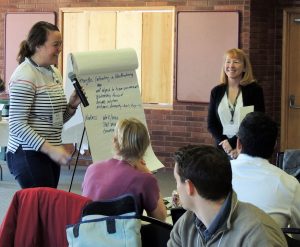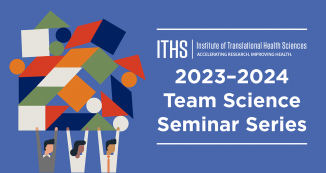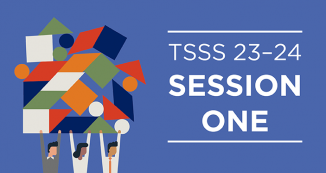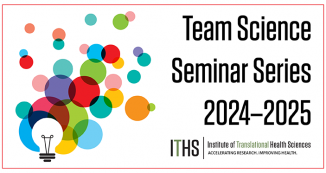
26 May Team Science Seminar Series: A Foundational Opportunity for Future Researchers
At noon on the first Thursday of each month since last October, the ITHS Team Science group has been hosting the Team Science Seminar Series, with sessions focusing on topics such as building and leading teams, handling conflict, multi-PI grants and designing research for health equity. The seminars have proven to be quite popular with ITHS members, who can attend live or watch online when their busy schedules allow. With one session to go in the 10-session pilot year, we spoke with Team Science Co-Director Brenda Zierler about why the series was created and how successful it has been.
I’m very excited to hear your thoughts on the inaugural season of the Team Science Seminar Series. Can you start by telling us a little about what the series is?
BZ: We developed the Team Science Seminar Series for those who want to be involved in team science. That could mean anyone from pre and post docs, early career faculty to senior faculty as well as research staff. We offer an annual training for existing research teams, but we wanted to increase access to team science education and training for individuals. We thought the ITHS Career Development Series would be a great platform. We’re offering a Certificate of Completion to anyone who attends at least 8 of the 10 sessions. We scheduled each session for the first Thursday of the month at noon for consistency, but we’re also posting recordings of the events so those who had other obligations at that time would be able to take advantage of the series.
What was the overarching goal of the team science seminar series, and do you feel you met it?
BZ: The goal of the series is to assist researchers in addressing challenges to collective team functioning, which includes improving communication and building trust with their collaborators and identifying the best way to solve problems collaboratively. We have been collecting evaluations, and we still have one more session scheduled for June. We look forward to analyzing all the data and reflecting on this pilot year to explore how we met our goals and to see where we can make adjustments. Overall, though, the initial feedback we have received has been very positive!
Most research is now conducted in teams, so this opportunity is foundational for future researchers.
What was the most common piece of feedback that you received from your audience?
BZ: We are planning a retreat this summer to review the feedback and plan for next year’s Team Science webinars. Using a conceptual framework and documented team science competencies is a new approach that we started this year. The most common feedback is that there was not enough time to adequately cover the topic, or that they wanted more exemplars and tools for the specific topic.
What was your most popular session?
BZ: We typically get good engagement when we focus on the personal attributes of individuals on teams, meaning things like social styles, conflict modes and leadership style, and on specific tools for managing meetings and interpersonal conflict. Michael Johnson, from the UW Foster School of Business, gave a session on Mindset and Humble Leadership which was well-received, and the session with the highest number of attendees was the talk on Self-Awareness.
Many grant funders are now requiring PIs to talk about their research teams, how they will resolve conflict, how they will work together to be more productive…
What did you enjoy most about the series?
BZ: Our entire Team Science team has participated in the series as facilitators, and we have enjoyed seeing and hearing from the early career faculty and pre- and post-docs about team functioning, team effectiveness and challenges with hierarchy and speaking up. We also learned a lot from our speakers and the questions the participants had. This work has led to other team science consultations and future teams for our annual team training which we are looking forward to holding next February.
Why do you think the Team Science Seminar Series could be an important part of ongoing professional development for research investigators?
BZ: Most research is now conducted in teams, so this opportunity is foundational for future researchers. Many grant funders are now requiring PIs to talk about their research teams, how they will resolve conflict, how they will work together to be more productive, and how each researcher receives academic credit for their participation. We provide individuals with language to describe how they will manage their research team and holding the series Certificate of Completion is a way to show these strengths in future grant applications. Our Team Science series gives individuals some insight into multiple PI grant funding opportunities, how to write together as an interdisciplinary team, and how to be more self-aware of their own behavior to better function as members of an interdisciplinary research team.
You can view any of the sessions from the Team Science Seminar Series via the links below.
| Session Title | Event Page Link |
|---|---|
| Introduction to the Team Science Seminar Series 2022-2023: Why is Team Science Important? | Watch event video here |
| Building Self-Awareness and Leadership Traits for Team Effectiveness | Watch event video here |
| Successful Meeting Management: Setting the Foundation | Watch event video here |
| Building and Sustaining Your Interdisciplinary Research Team | Watch event video here |
| Growth Mindset & Giving and Receiving Feedback | Watch event video here |
| Leading with Intention: Foundational Skills for Handling Interpersonal Conflict | Watch event video here |
| Creating Engagement: Facilitation from Chaos to Construct | Watch event video here |
| What Does a Successful Multiple-PI/Collaborative Grant Application Look Like: An Academic Community Panel | Watch event video here |
| Designing and Conducting Research for Health Equity | Watch event video here |
| Engaging Communities in Interdisciplinary Research | Watch event video here |








